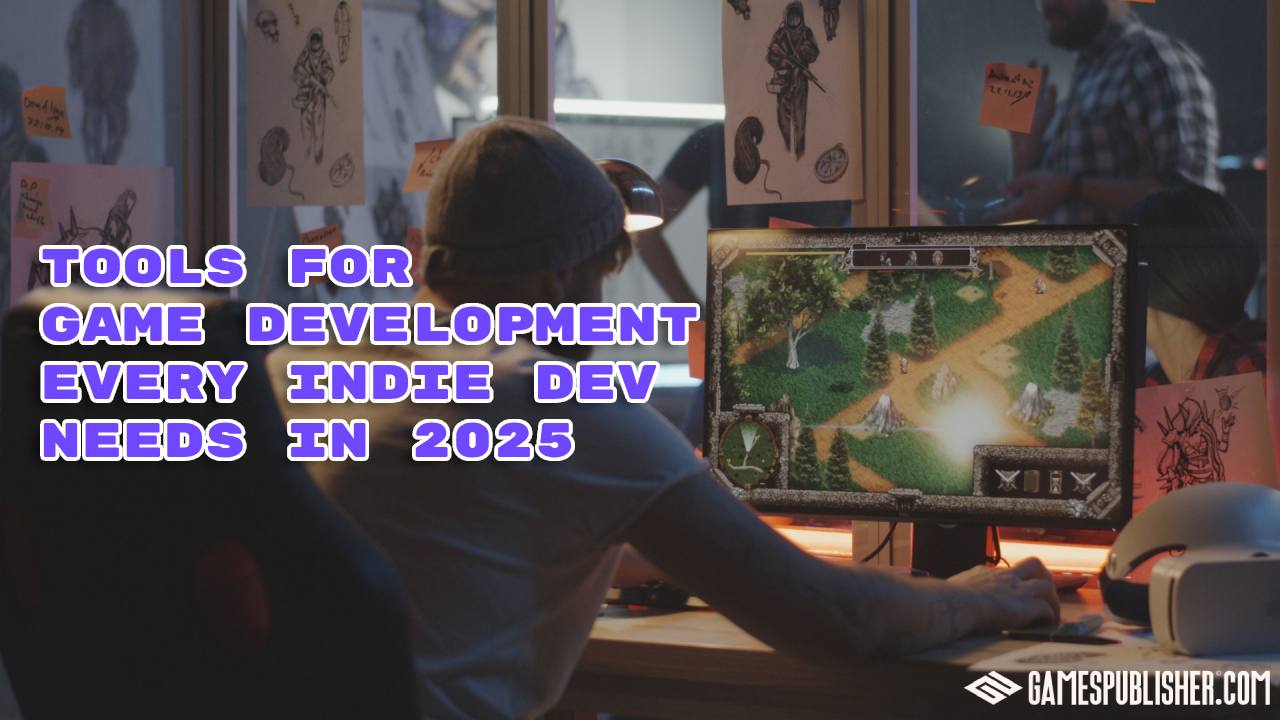Welcome to Gamespublisher.com’s ultimate guide for game developers aiming to sharpen their skills in 2026. Whether you’re an aspiring creator or a seasoned indie game developer, this article highlights the tools for game development that can streamline your workflow and elevate your projects.
As game design grows more complex and players demand top-notch quality across video game genres, reliable and efficient tools are essential. Today, indie devs face bigger challenges but also have access to powerful resources.
Here, we’ll cover key categories like game engines, asset creation, collaboration, testing, version control, and everything you need to succeed in game publishing this year.
Tools for Game Development: Game Engines That Dominate 2026
A solid engine for game development is the backbone of any indie project. In 2026, these standout options lead the pack for game developers.
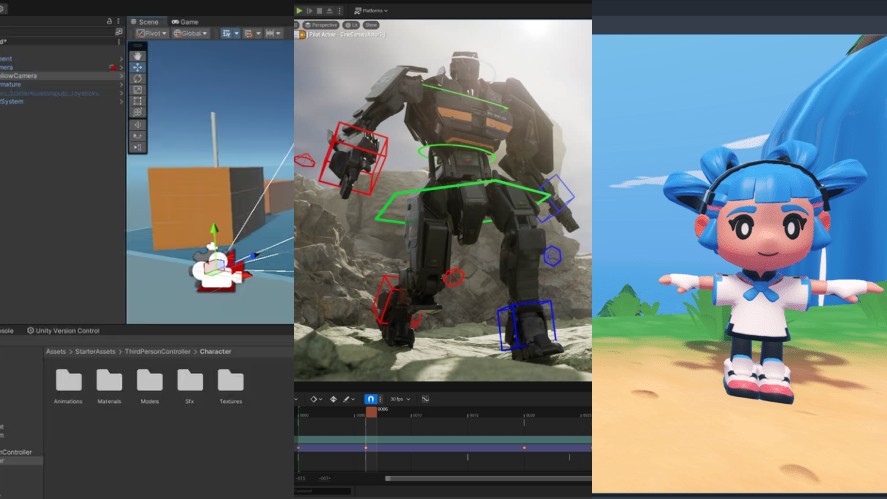
Unity
Unity remains a favorite for mobile and indie game development. Its versatility suits small teams crafting games in the Unity engine, from 2D hits to 3D adventures.
With updates in 2026, Unity boosts its visual tools and AI integration, keeping it relevant as the best game engine for indie developers seekers. For beginners, its ease and vast community make it a go-to.
Unreal Engine 5
Unreal Engine 5, on the other hand, powers high-end visuals that are perfect for ambitious indies who are eyeing AAA quality.
Features like Nanite for detailed geometry, Lumen for dynamic lighting, and MetaHuman for lifelike characters shine in games in Unreal Engine 5.
It’s ideal for devs with a best laptop for Unreal Engine 5 game development, offering cutting-edge gaming polish.
Godot 4
Godot 4 steps up as an open-source gem gaining ground in the indie scene. Its lightweight design and improved 3D support make it the best game engine for indie developers on a budget.
Because it’s free and flexible, Godot fits small teams exploring diverse game genres without heavy costs.
CryEngine and Amazon Lumberyard
Amazon Lumberyard and CryEngine cater to devs chasing advanced graphical fidelity.
CryEngine excels in photorealistic games in Unreal Engine-style visuals, while Lumberyard ties into AWS for robust backends.
Both see updates in 2026, though they suit niche video game genres needing extra power.
Choosing the Right Game Engine for Your Project
Picking the best game engine depends on your goals.
For mobile or 2D, Unity’s simplicity wins. If you’re a solo game developer targeting PC with stunning graphics, Unreal Engine 5 fits, assuming your rig handles it.
Godot 4 works for small teams on tight budgets, while CryEngine or Lumberyard suits larger indies with high-end needs.
Consider your platform, team size, and performance targets to align with your game development vision.
Tools for Game Development: Best Asset Creation and Design Tools
Creating standout assets is key for any game developer in 2026. These tools for game development help indie devs craft visuals that shine across video game genres.
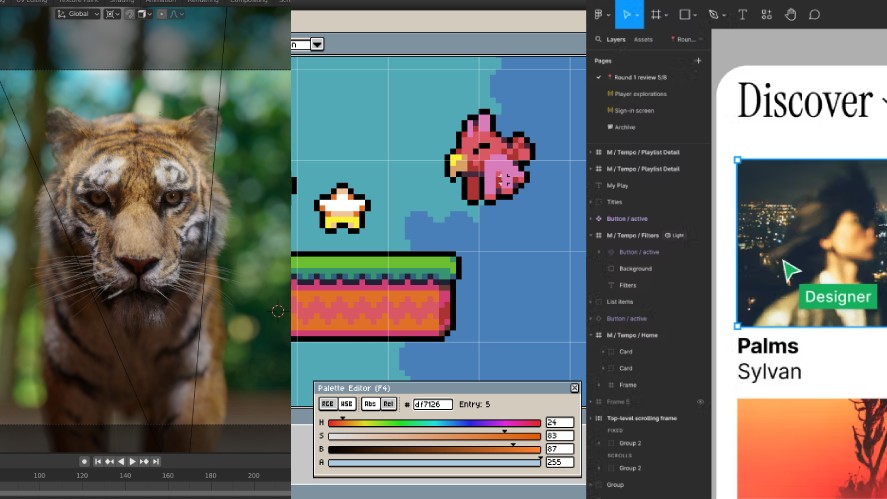
Blender
Blender remains a powerhouse for 3D modeling, rigging, and animation.
In 2026, its updates make it even stronger, offering game developers free, open-source tools to build detailed characters and worlds. Because it’s versatile, it pairs well with games in Unreal Engine or Unity.
Adobe Substance 3D Painter
Adobe Substance 3D Painter excels at realistic textures. Its PBR (physically based rendering) workflows let you paint lifelike materials for games made in Unreal Engine 5 or other engines.
For indies aiming for AAA polish, this tool delivers professional quality.
Aseprite
Aseprite keeps pixel art alive for 2D retro game genres. Affordable and intuitive, it’s perfect for game development teams crafting sprites or animations.
Since many indies lean into nostalgic styles, Aseprite stays a 2026 essential.
MagicaVoxel
MagicaVoxel speeds up voxel-style asset creation.
With its simple interface, you can design blocky 3D models quickly, ideal for unique gaming aesthetics. It’s a lightweight pick for the best game engine for indie developers users like Godot.
Figma and Adobe XD
Figma or Adobe XD tackles UI/UX design and prototyping. These tools help plan menus and interfaces before coding, saving time in game publishing workflows.
For collaborative game developers, Figma’s cloud sharing stands out.
Integrating Assets Seamlessly into Game Engines
Getting assets into your engine for game development takes some know-how.
Export from Blender in FBX or OBJ formats for compatibility with Unity or games in Unreal Engine 5. For textures, Substance 3D Painter outputs TGA or PNG files that slot into most best game engines for indie developers.
Optimize by reducing polygon counts in Blender or voxel sizes in MagicaVoxel to keep performance smooth, so it’s crucial for the best laptop for Unreal Engine 5 game development.
Remember to test imports early to catch issues and ensure your game development flows.
Tools for Game Development: Code and Scripting Editors
Writing clean, efficient code is vital for game developers, and the right editor can make all the difference in 2026.
These tools for game development streamline scripting for game development projects.
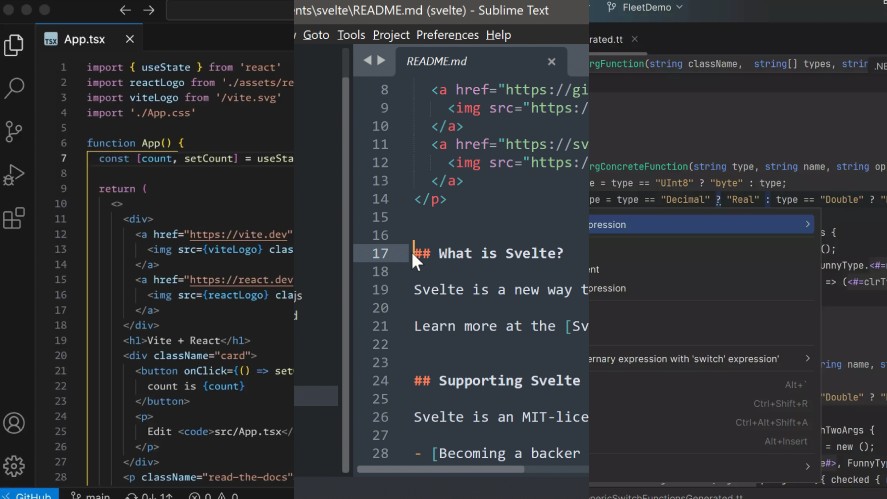
Visual Studio and VS Code
VS Code and Visual Studio remain top choices for game developers.
Visual Studio offers deep support for C# in games made in Unity engine, with smart code completion and Git integration for version control.
Meanwhile, VS Code’s lightweight design suits games in Unreal Engine scripting, adapting to multiple languages like C++ or even a game engine in JavaScript.
JetBrains Rider
JetBrains Rider stands out for Unity-focused game development.
Its powerful refactoring tools and C# debugging make it a favorite among devs crafting video game genres in Unity. Because it’s built for speed and precision, it’s perfect for solo or small-team game developers.
Sublime Text and Atom
Atom and Sublime Text offer lighter alternatives.
Sublime Text runs fast with plugin support for custom tweaks, ideal for quick edits in gaming scripts.
Similarly, Atom provides flexibility with community extensions, though it’s less resource-heavy than full IDEs. So, it’s great for best game engine for indie developers users on simpler setups.
Enhancing Productivity with Extensions and Shortcuts
Boosting efficiency is easy with the right extras.
For VS Code, grab the C# extension for Unity or Unreal Engine Tools for games in Unreal Engine 5, as they add snippets and error checks.
In Rider, the Unity Support plugin speeds up game development workflows with auto-imports. Sublime Text shines with Package Control plugins like Emmet for fast typing, while Atom’s GitHub integration keeps game publishing smooth.
Set keybindings, like Ctrl+D in VS Code to duplicate lines or Ctrl+R in Rider for refactoring, to save time and keep your tools for game development humming.
Tools for Game Development: Sound and Music Tools
Audio brings gaming worlds to life, and in 2026, indie game developers rely on top tools for game development to craft immersive soundscapes.
These options cover everything from effects to full scores.
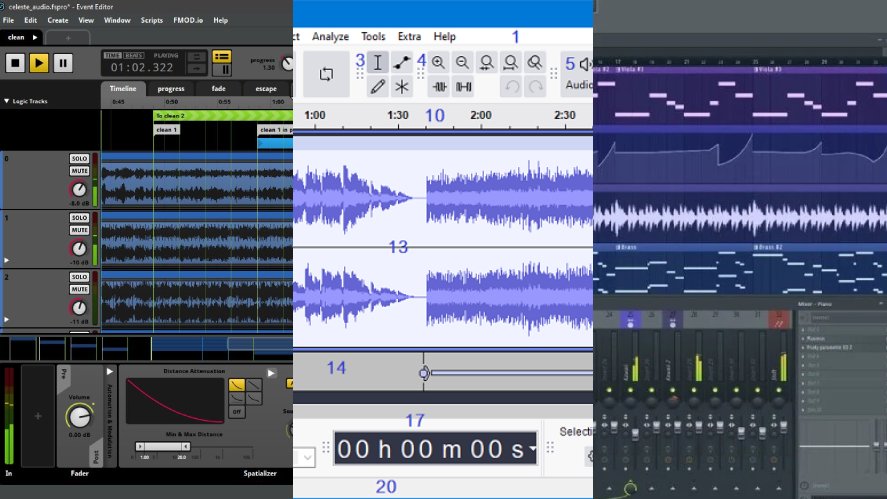
FMOD and Wwise
Wwise and FMOD lead as middleware for dynamic audio.
FMOD integrates seamlessly with games made in Unity engine or games in Unreal Engine, letting you tweak sounds in real-time, like footsteps changing on different surfaces.
Similarly, Wwise offers advanced mixing for video game genres, perfect for game development projects needing adaptive music or complex cues.
Audacity
Audacity stays a free, powerful choice for quick edits.
With its simple interface, game developers can trim clips, add effects, or clean up audio fast. Since it’s open-source, it’s a budget-friendly staple for users refining sound on the fly.
FL Studio and Ableton Live
Ableton Live and FL Studio shine for composing.
FL Studio crafts full scores or loops, ideal for game genres like RPGs with rich themes. Meanwhile, Ableton Live’s live-performance focus suits dynamic tracks for action-packed gaming moments.
Both empower indies to build professional audio from scratch.
Why Sound Design is Crucial to Game Experience
Good audio transforms game development into an immersive journey.
For starters, it pulls players in, think creaking doors in horror or epic scores in adventures boosting video game publisher appeal.
Next, it provides feedback, like a sword clash signaling a hit, guiding players through game mechanics.
Finally, sound tells stories, as soft melodies hint at calm, while chaos erupts in battle tones.
In 2026, nailing audio with these tools for game development makes your games in Unreal Engine 5 or Unity unforgettable.
Tools for Game Development: Collaboration and Project Management
Indie game development thrives on teamwork, and in 2026, the right tools for game development keep small crews aligned.
These options help game developers manage tasks and ideas efficiently.
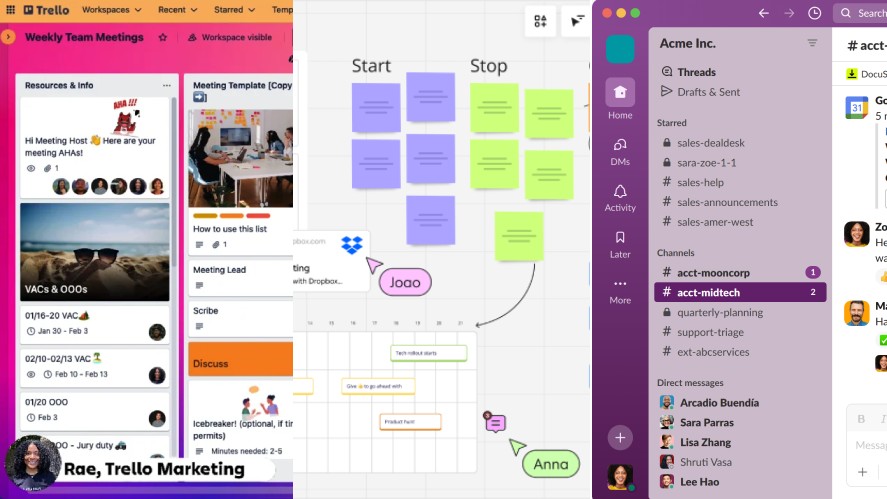
Trello, Notion, and Jira
Trello, Notion, and Jira excel at tracking progress.
Trello’s boards organize tasks simply, perfect for game genres with light milestones. Notion blends notes and schedules, offering flexibility for solo game developers or small teams.
Meanwhile, Jira suits complex game publishing projects, like games in Unreal Engine 5, with detailed bug tracking and sprints.
Miro and FigJam
FigJam and Miro spark creativity through whiteboarding.
Miro lets remote game developers brainstorm video game genres or map levels visually.
Similarly, FigJam’s playful design tools help teams sketch UI or mechanics, syncing ideas across gaming projects effortlessly.
Slack, Discord, and Microsoft Teams
Discord, Slack, and Microsoft Teams keep communication flowing.
Slack streamlines updates for best game engine for indie developers crews, while Discord’s casual vibe fits indie game development chats and community feedback.
For structured teams, Microsoft Teams ties into video game publisher workflows with file sharing and calls.
Keeping Indie Teams in Sync Remotely
Working across time zones challenges indie devs, but smart habits help.
First, set clear deadlines in Trello or Jira, noting time zone overlaps for game developer check-ins. Next, use Miro to store evergreen brainstorms, like mechanics for games made in Unity engine, so everyone contributes anytime.
Finally, pick a communication tool like Discord for quick pings and weekly syncs, keeping tools for game development humming.
Clear roles and async updates ensure game publishing stays smooth, no matter the distance.
Tools for Game Development: Version Control and Repositories
Keeping game development organized requires solid version control, and in 2026, these tools for game development help indie game developers manage code and assets seamlessly.
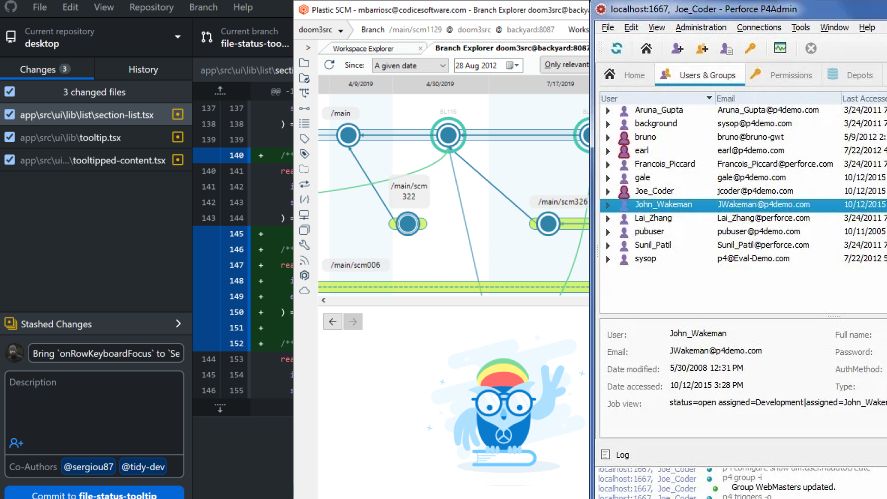
GitLab, GitHub, and Bitbucket
GitHub, GitLab, and Bitbucket remain essential for code versioning.
GitHub offers public or private repositories, making it a go-to for games made in Unity engine or game engine in JavaScript projects, with easy collaboration features.
Similarly, GitLab adds CI/CD pipelines, great for game publishing automation, while Bitbucket integrates tightly with Jira for game genres tracking.
Plastic SCM
Plastic SCM shines for handling large binary files like textures or models. Tailored for gaming assets in games in Unreal Engine 5, it’s faster than Git for big projects.
Because it’s built for video game genres with heavy visuals, it’s a favorite among indie developers scaling up.
Perforce
Perforce powers large-scale game development. Often seen in AAA studios behind games made in Unreal Engine, it handles massive files and teams with top performance.
For indies with growing needs, it’s a robust choice despite its steeper learning curve.
Best Practices for Version Control in Game Projects
Smart version control keeps game developer workflows smooth.
Start with branching and create separate lines for features like new game mechanics in GitHub or Plastic SCM, testing without breaking the main build.
Then, merge carefully and combine branches back after review, ensuring tools for game development like GitLab catch conflicts early.
For conflicts, like overlapping code in games in Unreal Engine, resolve by comparing changes and testing merges.
Commit often with clear notes, and backup assets in Plastic SCM or Perforce, keeping your game publishing pipeline clean and ready.
Tools for Game Development: Testing and Debugging
Testing and debugging are critical for game developers to deliver polished gaming experiences in 2026.
These tools for game development help indies spot issues and refine video game genres efficiently.
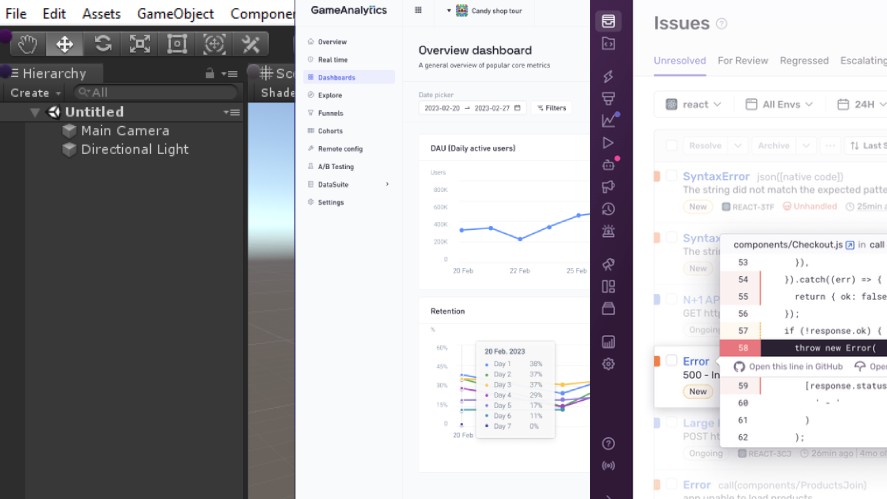
Unity Test Framework and Unreal Insights
Unreal Insights and Unity Test Framework are built into their engines.
Unity Test Framework runs automated checks for games made in Unity engine, catching bugs in scripts or mechanics fast.
Meanwhile, Unreal Insights tracks performance in games in Unreal Engine 5, offering game developers detailed logs on frame rates or memory use.
GameAnalytics, PlaytestCloud, and Maze
PlaytestCloud, Maze, and GameAnalytics focus on player feedback.
PlaytestCloud records real users testing your games in Unreal Engine, showing where they stumble.
Similarly, Maze gathers usability data, while GameAnalytics tracks behavior in game development projects, like how long players stay in a level.
Together, they fine-tune game publishing quality.
Sentry and Backtrace
Backtrace and Sentry tackle crashes head-on.
Sentry logs errors across platforms, alerting you instantly. Backtrace dives deeper, pinpointing crashes in games made in Unreal Engine with stack traces.
Both keep gaming smooth by catching problems early.
Automating QA Without Breaking the Budget
Indie studios can test smart without big costs. Start with free tiers, like Unity Test Framework and GameAnalytics.
Next, use PlaytestCloud’s pay-per-test model for occasional video game genres checks instead of full subscriptions. For crash tracking, Sentry’s free plan covers small game development needs, saving indie game funding for polish.
Automate simple scripts in tools for game development like VS Code to run repetitive tests, keeping QA lean and effective.
Tools for Game Development: Marketplace and Asset Libraries
Asset libraries speed up game development by offering ready-to-use resources in 2026.
These tools for game development save game developers time and effort across video game genres.
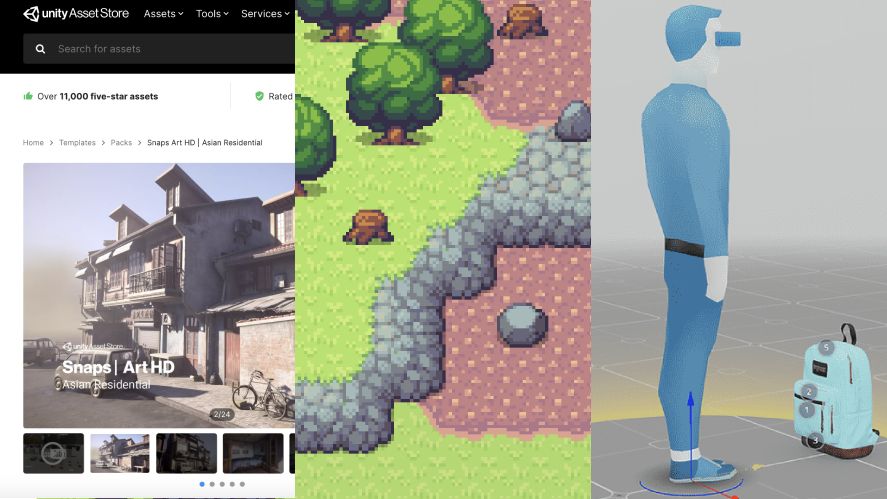
Unity Asset Store and Unreal Marketplace
Unreal Marketplace and Unity Asset Store lead with premium options.
Unity Asset Store provides 3D models, scripts, and shaders for games made in Unity engine, perfect for quick level design.
Similarly, Unreal Marketplace stocks high-quality assets for games in Unreal Engine 5, like character packs or effects, boosting gaming visuals for vodeo game publishers.
OpenGameArt and Kenney Assets
Kenney Assets and OpenGameArt deliver free resources.
OpenGameArt offers sprites and sounds for best game engine for indie developers projects, ideal for rapid prototyping.
Meanwhile, Kenney Assets supplies clean, simple models. It’s great for game genres like mobile or 2D without stretching indie game funding.
CGTrader and Sketchfab
Sketchfab and CGTrader cater to premium needs.
CGTrader sells detailed 3D assets for games in Unreal Engine, while Sketchfab’s library shines with animated models for standout game development.
Both suit indies aiming for unique, high-fidelity polish.
When to Buy vs. Build Your Game Assets
Choosing between buying and building depends on your setup.
If time’s tight, grab assets from Unity Asset Store or OpenGameArt to hit game publishing deadlines.
For budget-conscious game developers, free tools like Kenney save indie game funding, though they lack uniqueness.
However, building custom assets in Blender ensures originality for niche video game genres, worth it if your project’s scope demands a distinct edge.
Conclusion
Picking the right tools for game development in 2026 shapes your success as an indie game developer.
From engine for game development choices like Unity or Godot to asset libraries and testing suites, tools vary by team size, project scope, and goals.
Smart selections streamline production, enhance gaming quality, and boost collaboration, whether you’re solo or with a video game publisher. With these resources, indies can craft games made in Unreal Engine or Unity faster and better.
What’s your must-have tool? Share your favorites in the comments on Gamespublisher.com and join the game development conversation!
Loading survey...

